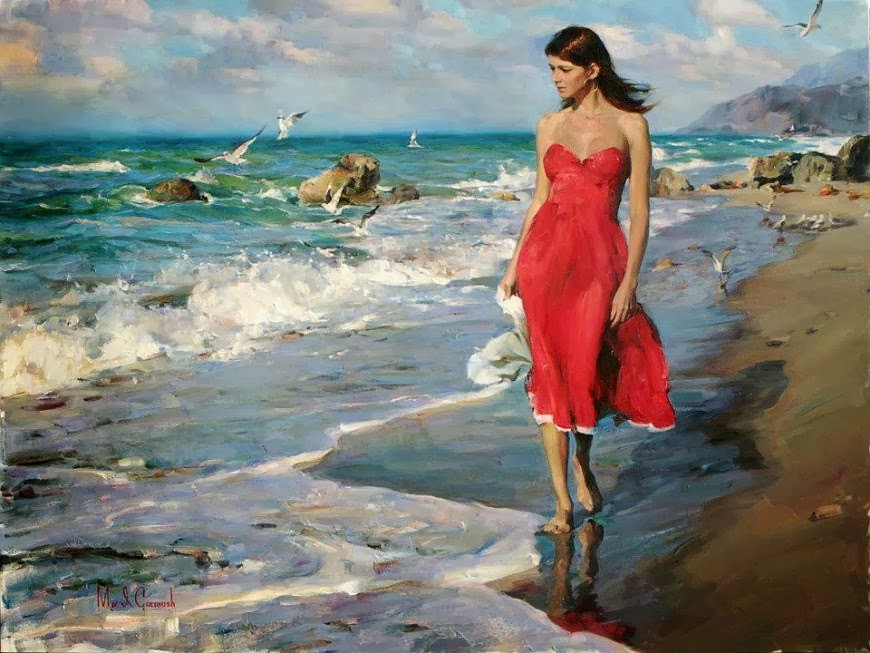
TAKING OFF EMILY DICKINSON CLOTHES
First, her tippet made of tulle,
easily lifted off her shoulders and laid
on the back of a wooden chair.
And her bonnet,
the bow undone with a light forward pull.
Then the long white dress, a more
complicated matter with mother-of-pearl
buttons down the back,
so tiny and numerous that it takes forever
before my hands can part the fabric,
like a swimmer’s dividing water,
and slip inside.
You will want to know
that she was standing
by an open window in an upstairs bedroom,
motionless, a little wide-eyed,
looking out at the orchard below,
the white dress puddled at her feet
on the wide-board, hardwood floor.
The complexity of women’s undergarments
in nineteenth-century America
is not to be waved off,
and I proceeded like a polar explorer
through clips, clasps, and moorings,
catches, straps, and whalebone stays,
sailing toward the iceberg of her nakedness.
Later, I wrote in a notebook
it was like riding a swan into the night,
but, of course, I cannot tell you everything –
the way she closed her eyes to the orchard,
how her hair tumbled free of its pins,
how there were sudden dashes
whenever we spoke.
What I can tell you is
it was terribly quiet in Amherst
that Sabbath afternoon,
nothing but a carriage passing the house,
a fly buzzing in a windowpane.
So I could plainly hear her inhale
when I undid the very top
hook-and-eye fastener of her corset
and I could hear her sigh when finally it was unloosed,
the way some readers sigh when they realize
that Hope has feathers,
that reason is a plank,
that life is a loaded gun
that looks right at you with a yellow eye.
§
Per prima, la mantellina di tulle,
tolta dolcemente dalle sue spalle e posta
sullo schienale di una sedia di legno.
E la cuffia,
sciolto il nodo con una leggero tiro in avanti.
Poi il lungo vestito bianco, una faccenda
più complicata con bottoni di madreperla
giù per la schiena,
così piccoli e numerosi che ci vuole l’eternità
prima che le mie mani possano dividere il tessuto,
come la separazione dell’acqua di un nuotatore,
e scivolare dentro.
Avrete voglia di sapere
che stava in piedi
accanto a una finestra aperta in una stanza al piano di sopra,
immobile, con gli occhi un po’attoniti,
mentre guardava di sotto l’orto,
con l’abito bianco in un mucchio ai suoi piedi,
sul pavimento di legno a grandi riquadri.
La complessità degli indumenti intimi femminili
nell’America del diciannovesimo secolo
non è da sottovalutare,
e io procedevo come un esploratore polare
attraverso fibbie, fermagli, e ormeggi,
ganci, nastri, e stecche di balena,
mente navigavo verso l’iceberg della sua nudità.
Più tardi scrissi in un taccuino
che era come cavalcare un cigno nella notte,
ma naturalmente non posso dirvi tutto –
il modo in cui ha smesso di guardare l’orto,
come i suoi capelli si sono sciolti dalle forcine,
come all’improvviso si inserivano dei trattini
ogni volta che parlavamo.
Quello che posso dirvi
è che ad Amherst c’era un’immensa quiete,
quel Sabato pomeriggio,
c’era solo una carrozza che è passata accanto alla casa,
e una mosca che ronzava sul vetro di una finestra.
Così ho potuto udirla distintamente inspirare
quando ho slacciato il primo
gancio in alto del suo corsetto
e l’ho sentita sospirare quando poi quello ha ceduto,
al modo in cui alcuni lettori sospirano quando si accorgono
che la Speranza ha piume,
che la Ragione è una tavola,
che la Vita è un fucile carico
che guarda proprio te con un occhio giallo.
BILLY COLLINS






